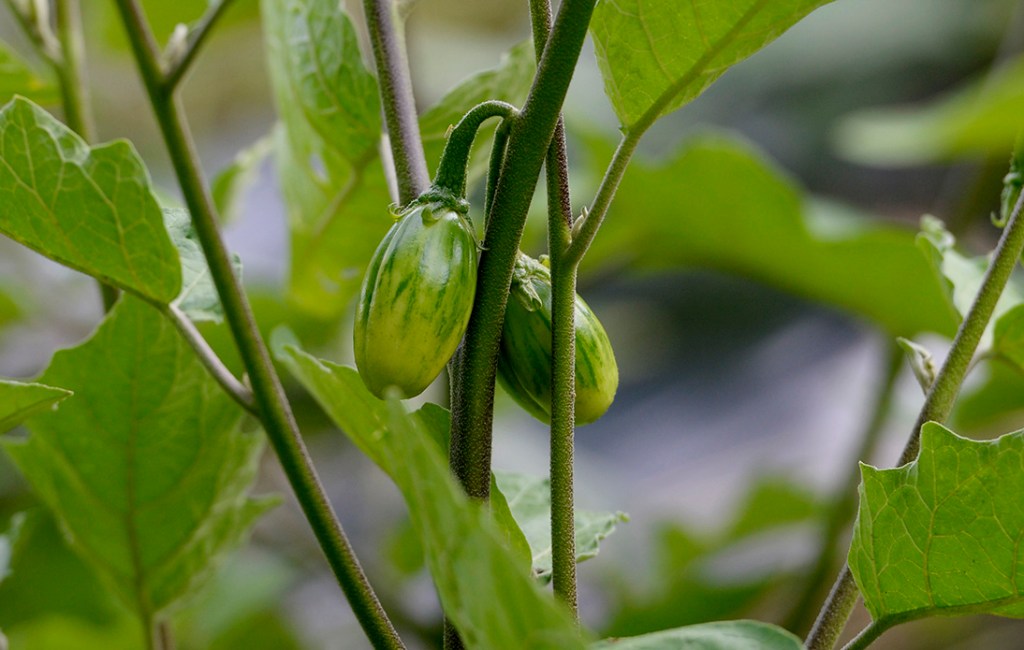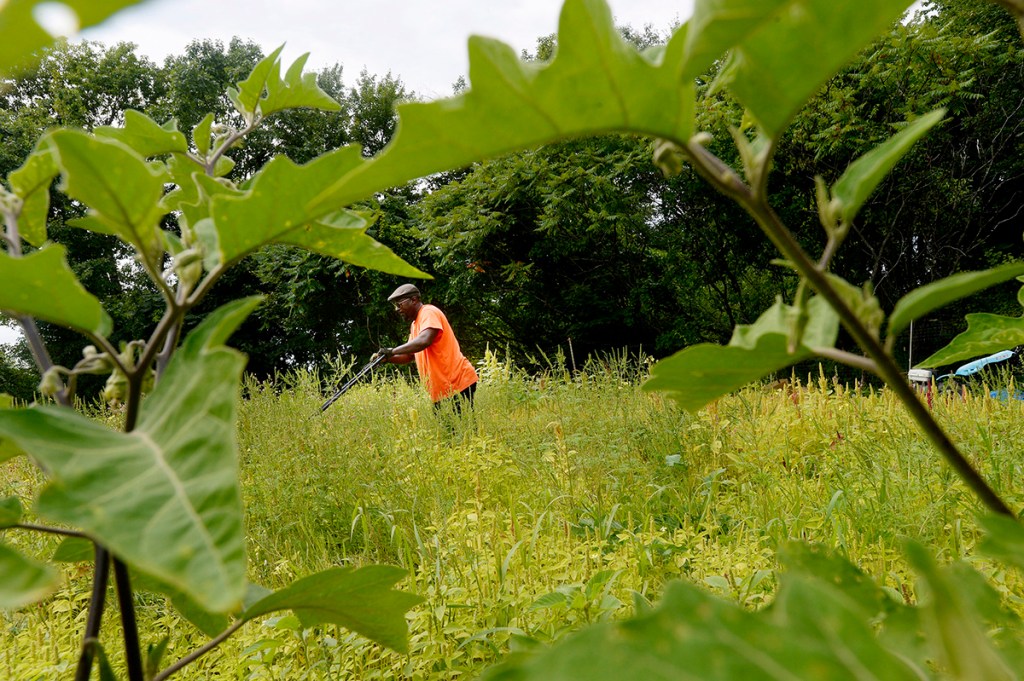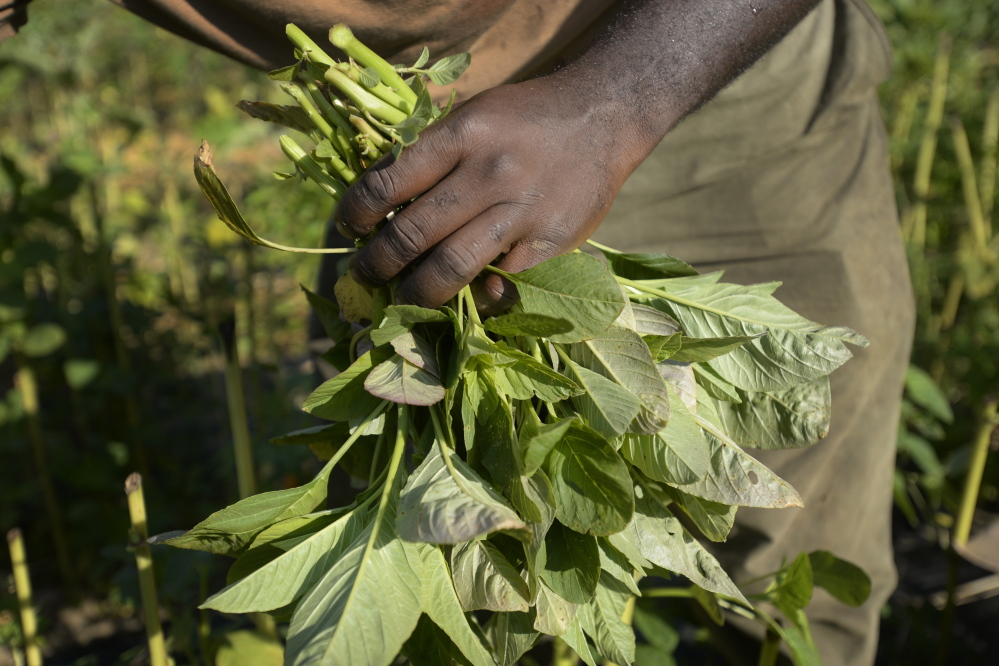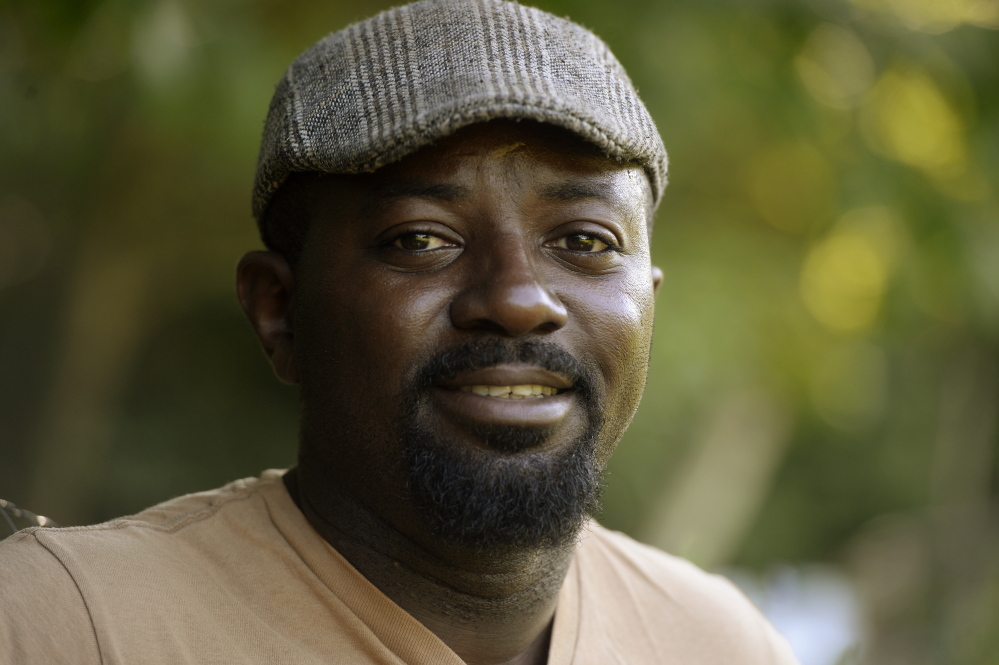Directions to Alfred Matiyabo’s farm in South Portland are not of the usual turn-at-the-big-red-barn variety: Take a left into a housing development, park next to his beat-up Dodge sedan (with 195,000 miles) and duck into the nearby underbrush. It’s like heading into some teenagers’ secret party lair. Or a homeless encampment.
But at the end of a narrow, well-trodden path is nearly an acre lined with Matiyabo’s vegetables: 1,000 tomato plants, 850 habanero chiles, rows and rows of amaranth, some pumpkins snaking their way across the ground and 500 eggplants.
The tomatoes came from your average FedCo seeds, the habaneros are noteworthy mostly because they’re blazingly hot. But the pumpkins, the amaranth and most of the eggplants are African varieties, the kind he remembers from his native Congo, their seeds ordered online. And these plants, cleaned, cut and packaged under his brand – Africando – in the commercial kitchen of a church in Portland, are crops specifically planted for a growing community of African refugees, Matiyabo’s customer base.
A PARTICULAR NICHE
Maine is filled with farmers experimenting with techniques and crops, but Matiyabo is an agricultural entrepreneur with a very particular niche. He does not deal in mornings at a picturesque, quaint farmers market or spend his days hobnobbing with the farm-to-table set. He sells to only one restaurant, Chez Biso na Biso, the new African restaurant on Munjoy Hill. Instead of traveling with cute chalkboard signs or a collapsible tent, he packs up an EBT machine and delivers to customers throughout the Portland area, making contacts at church, at parties, really everywhere he goes.
His customers are eager for the leaves of those pumpkin plants and for amaranth and eggplants that look familiar to refugees from places like the Congo, Burundi, Nigeria and Rwanda.
“People like to see something they have back home,” Matiyabo said as he pulled some late August weeds from between his rows of eggplants; they’d grown up while he was up in Montreal retrieving a load of another staple of the diet he grew up on – cassava leaves. That’s one of the African imports that regularly arrive in Montreal via containers from Africa – about 20 percent of Matiyabo’s business is selling imported goods. Cassava leaves come from a plant more commonly known here as yuca, a crop Matiyabo hasn’t yet been able to cultivate in Maine.
But he’d like to. Ten years into life as a Maine farmer, Matiyabo thinks big. He’s built one greenhouse in his backyard in Portland and is refining a second now: tighter seals, a better irrigation system, higher-quality plastic tarps, so he’ll be able to grow fresh African vegetables through December. He’d also like more land for planting. And to graze goats to sell for meat. And eventually, maybe he’ll win over other Mainers to the vegetables Africans hold dear.
‘I KNOW MY PEOPLE’
“Merci beaucoup!” said Alvaro Diabanza. He was beaming when he opened the door of his Forest Avenue apartment to find Matiyabo standing there with three bags of chopped and frozen amaranth leaves – lenga-lenga in Swahili, often called African spinach in America.
Diabanza is from Angola and has been buying from Matiyabo since he and his Congolese wife arrived in Maine 18 months ago. “I was so surprised and happy to find something that gives you the feeling of your country here,” Diabanza said.
Ditto for Evelyne Kanku, who has her own little garden in front of her Portland apartment but happily puts six bags of the amaranth into her freezer while Matiyabo runs her EBT card. Before she met him, she bought imported African vegetables. “Not the same quality,” she said, wrinkling her nose. “His quality is better.” She tells him she’ll let him know when she needs more.
“I’m on demand,” Matiyabo joked.
His entire farming project stems from understanding both the longing that immigrants and refugees have for something from home, and seeing the possibilities of recreating it in an entirely different climate, the past meeting the future in a South Portland field.
He’d started bringing African goods into Maine via a cousin who lives in Montreal and makes his living importing African goods for the large population of Congolese immigrants there (estimated at 20,000). Matiyabo could see that it made sense to import the cassava leaves, given that the yuca plant needs a good nine months in warm ground before harvest.
But dragging amaranth or eggplants across the world, eggplants that even he admits aren’t all that different from what you’d find at Hannaford, except in appearance? “I just thought it was ridiculous to do that,” he said.
Just getting by can feel like a triumph for any immigrant in his or her new country. But building a sustainable life, it seemed to Matiyabo, meant cutting out the middleman wherever possible.
By his estimate, about 500 Congolese families live in the Portland area, not to mention others from Central or West Africa. (Catholic Charities of Portland resettled 12 refugees from Congo in 2013, and a total of 219 primary refugees from African countries. More immigrants from Africa likely came to Maine last year as secondary migrants, that is, people who entered the United States through other states and have since moved here.) And even if his young daughters have a habit of telling his wife, Grace, “I am not from Africa!” he knows that the adults crave familiarity in the form of these touchstone foods. “I know my people,” he said.
“Alfred has had a very clear marketing plan and strategy from the beginning,” said Daniel Ungier, Cultivating Community’s director of farming training. “It has been very helpful to deal with someone who has that kind of clarity.”
ESCAPE FROM UNREST
Matiyabo came to America in 1998 with his parents and eight of his 10 siblings, two years after civil war broke out in the Congo. They were landowners in the eastern part of the Democratic Republic of the Congo (the western part of the region is the Republic of Congo) with a 10-acre farm and employees. “We had to run,” he said. The unrest has never really ended.
“It’s the capital of rape,” he said, quietly. He gets his news from National Public Radio and online, and none of what he hears is good.
Beyond rape as a crime of war, there is corruption, much of it involving two valuable resources, petroleum and coltan, the ore that is used for capacitors in cellphones, laptops and other electronics. Then there is the ongoing violence between Rwandans who fled to the Congo after the 1994 genocide there and pursuers from the current regime in Rwanda. Put that up against a Maine winter and the Maine winter wins every time.
The Matiyabo family went first to Benin, then applied for refugee status with the United Nations (two sisters remain in West Africa; their cases are pending). He was 20 when they arrived in Louisiana, sponsored by Catholic Charities. It was a hard transition. The economy in Louisiana was challenging and so was the process of integrating into their new community.
But an uncle had been in Maine since 1991 and felt good about the state. “He called us up here,” Matiyabo said. In July 1999, they arrived in Maine. Slowly his family has moved away, his parents to Iowa, sisters to Texas, Washington, D.C., and California. “I’m the only one here,” he said. But, he says, he wants to stay. This is home now.
He pursued the classic American dream for a while, getting a degree in electrical engineering from the University of Maine at Orono. But after his graduation in 2004, he couldn’t find an engineering job. He took a warehouse job for Hannaford and looked for land to grow vegetables on. That meant going from farm to farm, any place that looked like there was land to spare.
“I knocked on many doors,” Matiyabo said, laughing. He was often greeted with suspicion; was he planning on growing marijuana? “People would say, ‘What are you going to plant?’ ” he said. When he told them African vegetables, the suspicion didn’t exactly fade.
But eventually he was able to lease a small piece of land in Waterboro. He got in touch with Maine-based Coastal Enterprises Inc. (CEI), which funds development in rural communities, and the connection with CEI led to his relationship with Cultivating Community, the leaseholder on the land Matiyabo farms in South Portland (he shares the plot with another Cultivating Community beginning farmer). It was Ungier, the group’s director of farming training, who urged Matiyabo to apply for the Maine Organic Farmers and Growers Association’s Journeyperson program.
Two hundred new farmers have gone through that program, but Abby Sadauckas, MOFGA’s new farmer programs coordinator, believes Matiyabo is the first journeyperson from the refugee community.
“I think that MOFGA has been a little slow to recognize that there is a demographic outside the norm in this state,” Ungier said. For example, a MOFGA apprenticeship is a great program, he said. “There is nothing like that total immersion. But it doesn’t work for people like Alfred that are at a different point of life and have a family to support.” Matiyabo and his wife have four daughters, aged 18 months to 9.
The journeyperson program provides Matiyabo with a mentor – Lisa Turner from Laughing Stock Farm in Freeport, an appropriate choice given her reputation for growing great greens in all seasons – and an opportunity to further his farming education (he already earned his Master Gardener credential through the Cooperative Extension). He’s hoping Turner will help him figure out a better irrigation system for his greenhouses and teach him better planting techniques.
He’ll also attend the MOFGA Farmer to Farmer Convention. “They’ll pay for the hotel and everything,” Matiyabo said. For a man who is trying to eke out a few more years with that high-mileage Dodge, the one he says is “just going downhill” even after seven years of loving attention from a handy man with an engineering degree, every bit helps. “I’m just trying to stay afloat,” he said.
CULTURE CLASH
In Lisbon, where Cultivating Community leases 30 acres of the old Packard-Littlefield Farm to a couple dozen immigrant farmers, awareness of the African farmers is such that they’re no longer such a surprising sight. But last summer in South Portland, a dark-skinned man disappearing into the bushes with equipment slung over his shoulder raised alarms among the neighbors. Matiyabo heard a voice calling to him on a bullhorn and came back down to the cul-de-sac where he parks to find five police cars surrounding him.
“The timing was just a little bit off,” Ungier said. “We were working on our letter to neighboring property owners. That happened like the day before we were going to drop those letters in mailboxes.”
Matiyabo was bemused by the alarm he caused, a peaceful man who fled violence in his home country and has built a life around growing vegetables for people like him.
But he takes the culture clashes as inevitable and handles them with good humor. Like the time he called a woman who had advertised a goat for sale. Maine might have plenty of goats for goat cheese, but there’s not a lot of goat meat available. And the price is dear. Matiyabo said the price has gone from $45 a goat to $200 for meat goats in recent years.
Again, he sees an opportunity and wants to make something of it, to someday have enough land to raise goats for meat. In the meantime, he thought, why not get a starter goat?
The woman wanted to know what plans he had for it. He told her. Although without mentioning how good that goat might be with the combination of cassava leaves, scallions and habanero that Grace is so skilled at making. “She was in shock,” he said, chuckling. “It was a pet.”
He gets it, though. Customs are customs. Perspective is everything. One man’s meat, after all. Or one man’s plant: As he was undergoing the state inspection process required for him to wash and package his vegetables at Williston-Immanuel United Church in Portland, the state inspector puzzled over the amaranth. “He said, ‘That’s a weed!’ ” Matiyabo said. “But not where I come from.”
Send questions/comments to the editors.









